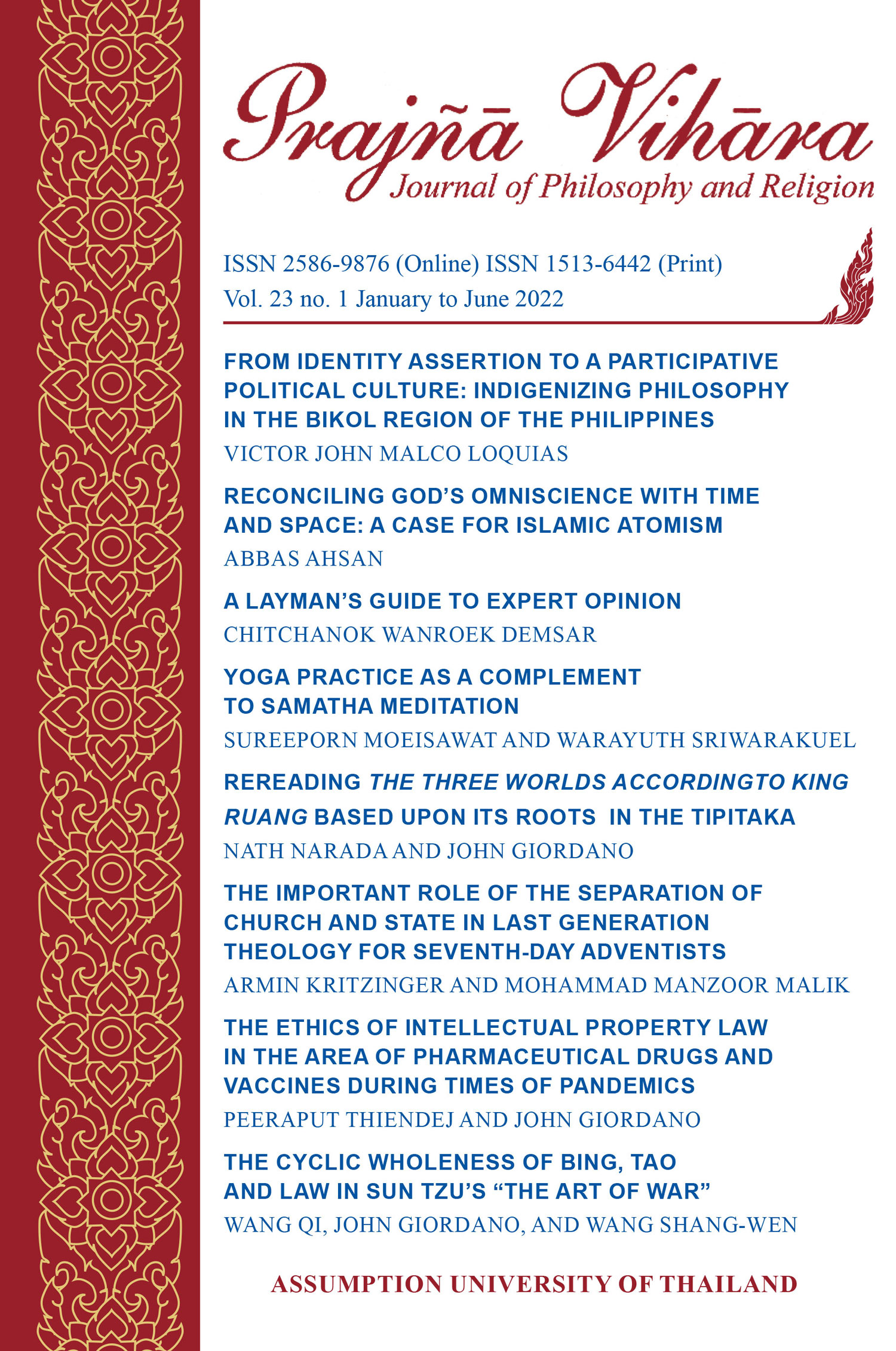THE IMPORTANT ROLE OF THE SEPARATION OF CHURCH AND STATE IN LAST GENERATION THEOLOGY FOR SEVENTH-DAY ADVENTISTS
Abstract
This paper takes a contemporary look at the discussion and
analysis of the concept of separation of church and state
from a Seventh-day Adventist perspective. The separation
of church and state means that the government should not
enforce any specific religion on the population, and should
not prohibit the population to follow any specific religion.
The separation of church and state can clearly be seen in
the First Amendment of the United States Constitution.
Philosophers like Locke strongly opposed the combination
of church and state, and during the Dark Ages, where the
church largely controlled the state, we can see how many
people were killed by the Roman Catholic Church and its
subsidiaries for following their consciences. History has
shown us that in countries where religion and state has
not been kept separate, there is persecution of the masses.
The Bible, and Seventh-day Adventist Christian authors
like Alonzo Jones and Ellen White, completely reject the
idea of the state wanting to enforce religious rules on their
people. These authors believed in the central idea of Last
Generation Theology, which is that the last generation
of Christians who are alive when Christ returns will live
lives completely free from sin. In order to be encouraged
Prajñā Vihāra Vol. 23 no. 1 January to June 2022, 109-121
© 2000 by Assumption University Press
110 Prajñā Vihāra Vol. 23 no. 1 January to June 2022
to be completely obedient to God in all areas that He
requires, it is crucial to have the freedom to follow your
conscience without the interference of the civil authority.
The combination of church and state therefore seems to
play a major role in the eschatology of Christianity as it
relates to Last Generation Theology.
References
Bender, Harold. The Anabaptists and Religious Liberty in the Sixteenth
Century. Unknown, 1955.
Cornell University Law School. First Amendment. Cornell University Law
School Legal Information Institute, 2013.
Feldman, Noah. Social Research: An International Quarterly. Maryland:
John Hopkins University Press, 2009.
Feldman, Noah. Divided by God. New York: Farrar, Straus and Giroux,
Gilpin, Henry. Elliott’s Debates, Volume 2. Washington: Langtree &
O’Sullivan, 1840.
Hamilton, Bernard. “Inquisition”. Britannica. Accessed February 2, 2022.
https://www.britannica.com/topic/inquisition
International Service for Human Rights. “Who protects human rights?”
About Human Rights. Accessed February 1, 2022. https://ishr.ch/
about-human-rights/who-protects-human-rights/
Loconte, Joseph. “Martin Luther and the Long March to Freedom of
Conscience.” National Geographic. Published October 27, 2017.
https://www.nationalgeographic.com/history/article/martin-lutherfreedom-
protestant-reformation-500#:~:text=Luther%20argued%20
that%20burning%20heretics,will%20of%20the%20Holy%20
Spirit.%22&text=%E2%80%9CHe%20can%20neither%20teach%20
nor,concept%20that%20Luther%20ultimately%20rejected.
Jones, The Union of Church and State in the United States, 3.
Jones, The Rights of the People, 5.
Jones, The Two Republics, Rome and the United States of America, 483.
Cornell University Law School, “First Amendment”.
White, Evangelism , 235.
Ibid.
White, The Great Controversy, 188.
Ibid., 580.
Armin Kritzinger and Mohammad Manzoor Malik 121
Marek, Rafal. “Caesaropapism and the Reality of the 4th-5th Century
Roman Empire.” Reality. Published January 1, 2017. https://www.
researchgate.net/publications/318487059_Caesaropapism_and_
the_Reality_of_the_thth-5th_Century Roman_Empire
Mark, Joshua. “The Medieval Church.” World History Encyclopedia.
Published June 17, 2019. https://www.worldhistory.org/Medieval_
Church/
Masters, Voltaire. Treatise on tolerance. Cambridge University Press, 2000.
Newhook, Joshua. “Free Speech Has Gone Mad”. The Collegian. Published
September 23, 2021. https://hillsdalecollegian.com/2021/09/freespeech-
has-gone-mad-says-michael-knowles/
Jones, Alonzo. The Union of Church and State in the United States. ID:
Pacific Publishing Association, 1892.
Jones, Alonzo. The Two Republics, Rome and the United States of America.
ID: Pacific Publishing Association, 1891.
Jones, Alonzo. The Rights of the People. ID: Pacific Publishing Association,
White, Ellen. Acts of the Apostles. Maryland: Review and Herald Publishing
Association, 1911.
White, Ellen. Evangelism. Maryland: Review and Herald Publishing
Association, 1946.
White, Ellen. Great Controversy. Maryland: Review and Herald Publishing
Association, 1888.
White, Ellen. The Desire of Ages. Maryland: Review and Herald Publishing
Association, 1898.
Downloads
Published
Issue
Section
License
Consent to Publish and Transfer of Copyright
By publishing in Prajñā Vihāra, the author agrees to transfer and assign to Assumption University of Thailand as the Publisher of the Journal, the copyright to the Article in any form, including any and all rights, interests and claims related to it.
The author does retain the following rights:
- The right to make further copies of the published article for their use in classroom teaching.
- The right to reuse all or part of the published article in a compilation of his or her own works or in textbooks of which they are the author or coauthor.
- The right to make copies of the published article for internal distribution within their academic institution.
- All proprietary rights other than copyright, such as patent rights.
- The Article is his or her original work, and has not been published previously and is not under consideration for publication elsewhere.
- It does not contain any matter that is obscene, libelous, or contrary to law.
- They have obtained the necessary license or written authority and paid any and all related fees for the use and reproduction of text, tables, illustrations and other copyrighted work from the owners of the intellectual property rights, and can furnish the Publisher copies of the license/written authority and proof of payment of related fees upon the signing of this Agreement.
- They have the consent of the Co-Authors of the article upon the signing of this Agreement.
- In the event that they intend to republish, reprint or translate all or part of the Article in other publications, they will secure the prior written permission from the journal Editor.
Prajñā Vihāra adopts the Creative Commons Attribution (CC BY-NC-ND) license


